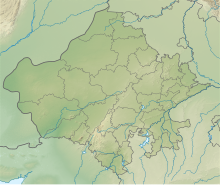
Back हल्दीघाटी का युद्ध Hindi Pertempuran Haldighati Malay ਹਲਦੀਘਾਟੀ ਦੀ ਲੜਾਈ Punjabi ہلدی گھاٹی دی لڑائی PNB Битва при Халдигхати Russian ஹல்டிகாட் போர் Tamil హల్దీఘాటీ యుద్ధం Tegulu ہلدی گھاٹی کی لڑائی Urdu
| Battle of Haldighati | |||||||||
|---|---|---|---|---|---|---|---|---|---|
| Part of Mughal–Rajput wars | |||||||||
 Painting of the traditional account of the battle by Chokha of Devgarh, 1822 | |||||||||
| |||||||||
| Belligerents | |||||||||
| Mewar Kingdom | Mughal Empire | ||||||||
| Commanders and leaders | |||||||||
|
| ||||||||
| Strength | |||||||||
|
3,000 cavalry 400 Bhil archers Unknown number of elephants |
10,000 men Unknown number of elephants | ||||||||
| Casualties and losses | |||||||||
| 500 dead (According to Abul Fazl) | 150 dead (According to Abul Fazl) | ||||||||
| ʽAbd al-Qadir Badayuni who was present in the battle says that 500 men were killed from both sides, of which 120 were Muslims. | |||||||||
Location within Rajasthan | |||||||||
The battle of Haldighati was fought on 18 June 1576[a] between the Mewar forces led by Maharana Pratap, and the Mughal forces led by Man Singh I of Amber. The Mughals emerged victorious after inflicting significant casualties on Mewari forces, though they failed to capture Pratap, who reluctantly retreated persuaded by his fellow commanders.
The siege of Chittorgarh in 1568 had led to the loss of the fertile eastern belt of Mewar to the Mughals. However, the rest of the wooded and hilly kingdom was still under the control of the Sisodias. Akbar was intent on securing a stable route to Gujarat through Mewar; when Pratap Singh was crowned king (Rana) in 1572, Akbar sent a number of envoys entreating the Rana to become a vassal like many other Rajput leaders in the region. However, Pratap refused to enter into a treaty, which led to the battle.
The site of the battle was a narrow mountain pass at Haldighati near Gogunda in Rajasthan. Sources differ on the strength of the respective armies but probably the Mughals outnumbered the Mewar forces by a factor of four to one. Despite initial successes by the Mewaris, the tide slowly turned against them and Pratap found himself wounded and the day lost. A few of his men under Jhala Man Singh covered his retreat in a rearguard action. The Mewar troops were not chased in their retreat by Man Singh for which he was banished from the Mughal court for some time by Akbar.
Despite the reverse at Haldighati, Pratap continued his resistance against the Mughals through guerrilla warfare, and by the time of his death had regained much of his ancestral kingdom.
- ^ Nanda K. (1949). A Short History Of Akbar (1949). S. Chand and Co., Delhi. pp. 43–44.
- ^ Hooja, Rima (2006). A History of Rajasthan. Rupa & Company. ISBN 978-81-291-0890-6.
- ^ Majumdar, Ramesh Chandra (1974). The History and Culture of the Indian People: The Mughal empire. Bharatiya Vidya Bhavan.
- ^ de la Garza 2016, p. 56.
- ^ Raghavan 2018, p. 67.
- ^ Ram Vallabh Somani 1976, p. 230:"Several chiefs of Mewar lost their lives. Prominent among them were Netasingh, Dodiys Bhim, Sonagara Man, Rathor Ramdas, Sankardas, Tomar Ram Shah and his 3 sons, Hakim Khan Sur Rama Sandu etc"
- ^ Ram Vallabh Somani 1976, p. 229: "Madhosingh Kachhawa inflicted a wound on the Rana, who counter attacked and killed Bahlol Khan, a senior Mughal officer"
- ^ Ram Vallabh Somani 1976, p. 227:"The shelter of the Mughal centre, Kachhawa Jagnnath fought desperately and was about to fall but was rescued by the timely help of the Reserves sent under Kachhawa Madhosingh"
- ^ Sharma, G.N. (1962). Mewar and the Mughal Emperors: 1526–1707 A. D. Shiva Lal Agarwala. p. 98. Retrieved 20 June 2022.
Qazi Khan, although he was but a Mulla, stood his gournd manfully, until receiving a similar blow on his right hand which wounded his thumb, being no longer able to hold his own, he receited (the saying) – Flight from overwhelming odds is one of the traditions of the Prophet and followed his men (in the retreat).
- ^ Ram Vallabh Somani 1976, p. 228:"The Shekh Zadas of Sikari fled away: An arrow struck Shah Mansur, who soon left the field"
Cite error: There are <ref group=lower-alpha> tags or {{efn}} templates on this page, but the references will not show without a {{reflist|group=lower-alpha}} template or {{notelist}} template (see the help page).

